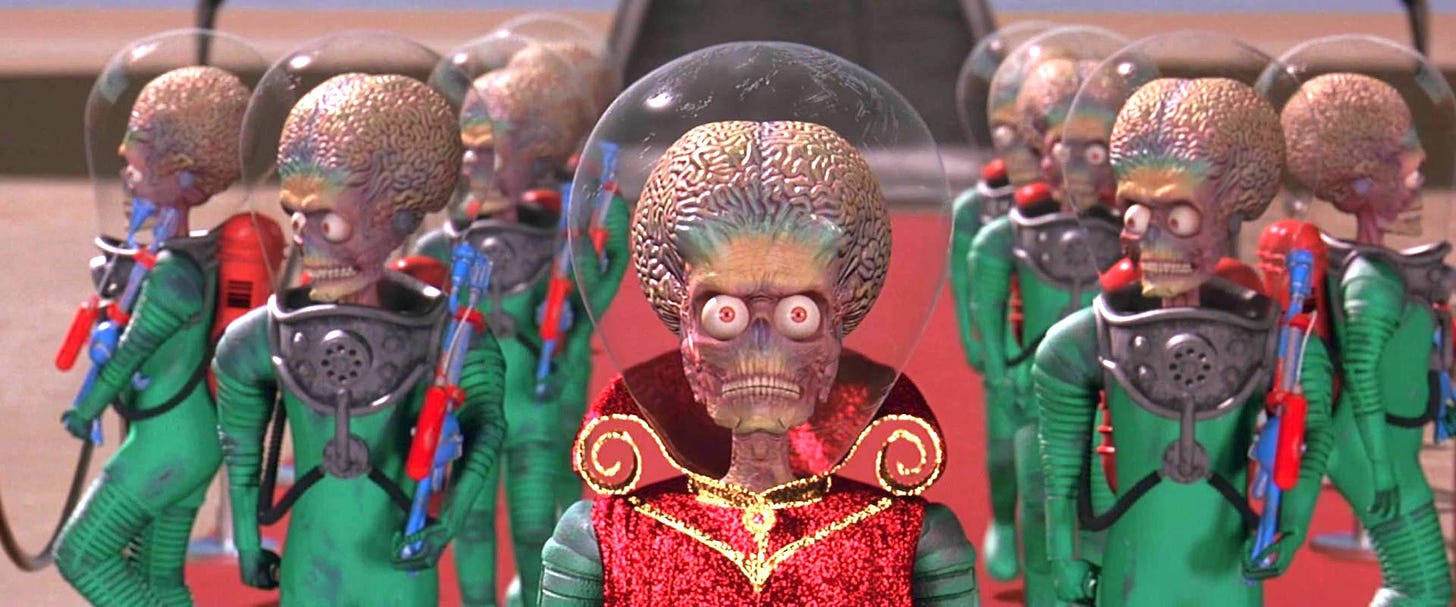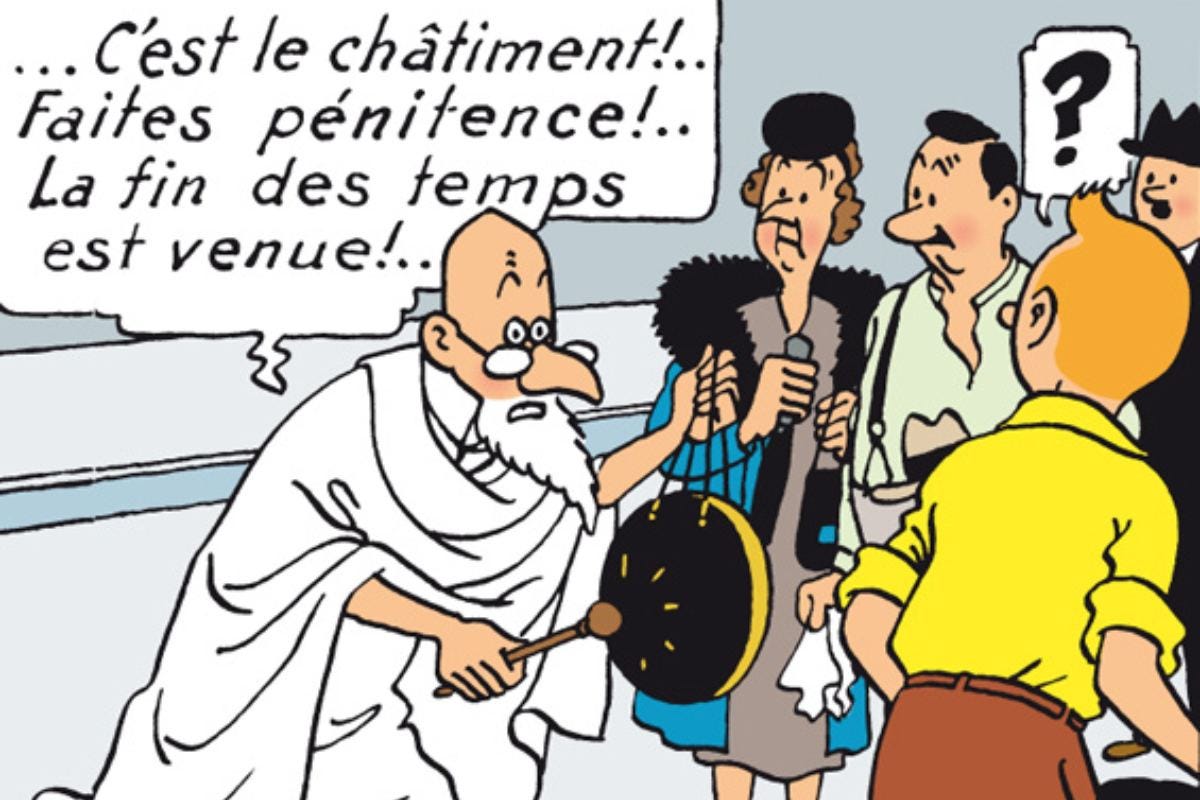Yet Another Piece of Commentary About “Don't Look Up”
AWM #60: Existential risk, moralistic movies, and doomsday prophecies 💥
So I watched Don’t Look Up. Twice.
I watched it a first time (during the holidays) because the premise of the movie — a planet-killer comet is going to destroy humanity, and we need to act now, but nobody except a few scientists seem to care — was intriguing. I watched it a second time (last night) because there is a lot of commentary around the movie, to the extent that it seems to be a major cultural event, and it’s a good idea to try to understand major cultural events.
Here’s my take. I’m not going to take extra care avoiding spoilers (as some of you know, I think we should collectively care less about spoilers), but I won’t go into details either, so you should be fine. This piece of commentary by Scott Alexander contains a good summary, if you need one.
Interpreted to the first degree, Don’t Look Up is about a comet that’s going to destroy humanity.

To the second degree, it’s about climate change. That’s not a hidden metaphor — making an allegory of the climate crisis was an explicit goal of the creators, Adam McKay (the director and co-screenwriter) and David Sirota (the other co-screenwriter).
To the third degree, it’s a movie about any major crisis or existential risk, and our collective reaction to these things. As writes Matthew Yglesias, the movie is more fun when you interpret it as wider than just climate change. It could be covid, nuclear war, rogue AI, whatever. The chief of staff of the US president, in the movie, has a great line about how scientists come to the president with predictions of catastrophe due to various causes, which I see as a warning against doomsaying — as in the crying wolf trope, if you desensitize top leaders to doom, then it’s bad when actual doom happens!
At all degrees, though, the story about disaster is only a pretext. The true topic of Don’t Look Up is the media, culture, and our collective inability to pay attention to anything.
We’re constantly distracted. We bemoan the theft of our attention by technology and social media, as illustrated by the powerful cell phone company in the film. We spend a lot of time thinking about celebrity gossip, like Ariana Grande’s character represents. We vote in increasingly small numbers at elections, and we care very little about politics anymore except the part that is a spectacle — which is why we get politicians like Trump or the female copy of Trump in the movie.
A society that is unable to pay attention to impending existential risk is an exaggeration, an extreme case, but it is not that far from reality. In depicting this, I think the movie does a good job.
Not everyone thinks that, though. It received very mixed reviews. On Rotten Tomatoes, it gets a 55% Tomatometer score (though, interestingly, the score determined by the audience is much higher, at 77%). For fun, here’s a sample of some of the critics who didn’t like it:
downright unpleasant, shrill viewing experience
it mostly makes you tired
not smart satire
a failure on too many levels
If I wanted to get preached at, I'll just go to church.
leaden when it could be farcical, sluggish when it could be screwball
The movie might as well have been called "blah blah blah!"
And most devastatingly:
"Don't Look Up" is 2021's "Mars Attacks!"

Now of course, people are free to like or dislike a movie. Certainly Don’t Look Up has tons of flaws. On my first viewing, I was kind of disappointed at how exaggerated the satire was, and the plot really stressed me out. It got better in the second half, when the events became so silly that I couldn’t take them seriously anymore, and I decided to just enjoy the ride.
(On my second viewing, it mostly made me sad. Honestly, it’s probably better not to think of Don’t Look Up as a comedy, and I wonder if some of those who disliked it expected that they would laugh more than they did.)
A lot of the complaints involve some variation of “it’s too heavy-handed” or “it’s not subtle enough.” This is perfectly fair criticism. But it rings… somewhat hollow, considering the subject matter.
Nathan J. Robinson writes it better than me in the essay ‘Critics of “Don’t Look Up” Are Missing the Entire Point‘:
We can imagine, in the world of the film, those concerned about the comet making a film that satirized the lack of national action to stop the comet. And in the world of the film, reviewers simply respond by calling it “heavy-handed,” the director’s “worst film yet,” saying it “misses its targets,” that its humor is too “broad.” Instead of discussing the issues the film raises, they discuss whether the film is good or bad and whether it is successful in the way that it approaches the issues.
For any other movie, I’d be perfectly happy to say, “feel free to enjoy it or dismiss it as insufferable, it’s just a movie after all.” For this one, it seems like that would be exactly the same mistake as most of the characters in the movie make.
As a result, the most interesting part of Don’t Look Up isn’t the movie itself. It’s not the plot, nor the acting, nor the editing, the cinematography, not even the moralistic message it’s trying to convey. No, the most interesting part is our collective reaction to it.
We don’t typically get precise numbers from Netflix, but all signs point to the film being extremely successful in terms of viewership. The sheer amount of opinion pieces, tweets, blog posts and so on about it clearly mean it’s hitting something important in the zeitgeist. Collectively, we can’t ignore Don’t Look Up. We’re bothered.
But in a lot of cases, this annoyance manifests itself through criticism of the movie itself. We can’t disagree with the message: climate change is something that we seem to be unable to collectively tackle, and even if, like me, you think it’s not as worrying as a comet impact would be, the third and first degrees of interpretation are still potential catastrophes (a comet impact or an AI takeover could happen!). So instead we disagree with the messenger.
Don’t Look Up is a doomsday prophet, impolite, tiresome, wearing weird clothes and a long dirty beard. “Go away,” we want to tell this old man with bad manners. “Sure, you may be right, but why do you have to say it in such an unpleasant way?”

I’m not sure that Don’t Look Up could have avoided this. Even if it had been a cinematographic masterpiece, we would have paid more attention to how good it was than to its message.
So regardless of what you thought of the movie, the fact that it was streamed by millions of people is an immense success. If it gets only a tiny fraction of those people to care more about existential risks and especially the institutions that must deal with such risks, then it will have done a lot of good.
Plus, I actually liked it. So, good job, Mr. McKay.





